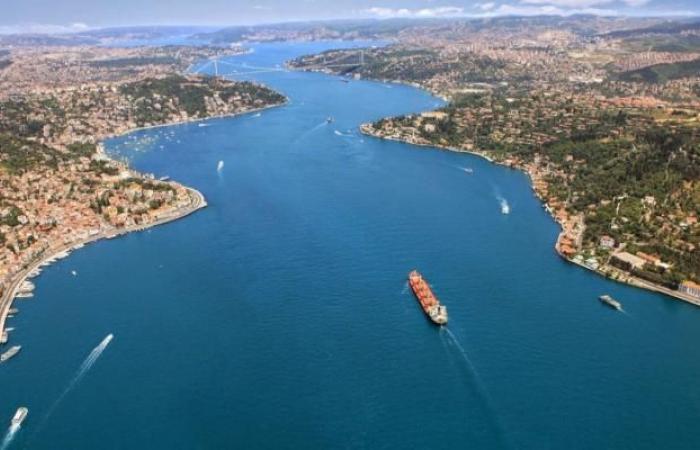Turkey's announcement to ban all warships from crossing the "Bosphorus and Dardanelles" straits under the "Montreux" agreement came as a major change in its policy towards the Russian-Ukrainian war.
On Monday evening, Turkish Foreign Minister Mevlüt Çavuşoğlu said that Turkey had warned countries bordering and not bordering the Black Sea against crossing warships through the Bosphorus and Dardanelles straits.
This came after Ukrainian insistence, as Kiev asked Ankara, with the first days of the Russian military operation, to close the straits to Russian warships.
What is the Montreux Convention?
The Montreux Convention was signed in 1936 in Switzerland, and it is an agreement that gives Turkey certain control over the passage of warships from the Dardanelles and Bosphorus straits that connect the Aegean Sea, Marmara and the Black Sea.
In peacetime, warships could cross the straits by prior diplomatic notification with certain restrictions on the weight of the ships and the weapons they carried, and depending on whether or not the ship belonged to a Black Sea country. And in times of war, Turkey can prevent the passage of warships of the warring parties from crossing.
According to the agreement, if Turkey is a party to the war or considers itself threatened by imminent danger, it can close the strait to the passage of warships.
Safety valve
According to observers, "This treaty was considered a safety valve for Turkey and Western countries in the face of Soviet threats during the Cold War era."
They explained that "after the end of the Cold War and the dissolution of the Soviet Union, the agreement witnessed a major shift due to the change in the balance of power in the Black Sea, the change in the tendencies of some countries bordering it towards the West, and the accession of Bulgaria and Romania to NATO, which made Washington pressure to make the terms of the agreement More flexibility for the movement of its warships to and from the Black Sea, which Ankara is trying to prevent.

How does this affect Russia?
According to CNN, Russia and Ukraine are located on the Black Sea, along with Romania and NATO members Bulgaria and Georgia, and Turkey can limit the passage of Russian warships from The Mediterranean Sea to the Black Sea via its straits was established under the Montreux Convention, but the agreement includes a clause allowing warships of warring countries to cross if they are returning to their home base.
It quoted Mustafa Aydin, head of the Turkish Council for International Relations think tank, as saying that this step would be only symbolic.
Aydın added: "Russia has enough firepower in the Black Sea that makes it illogical for NATO countries to intervene," noting that "Russia has complete sovereignty over the waters."
As Serhat Guvenc, a professor of international relations at Kadir Has University in Istanbul, said that if the war drags on, Moscow may feel the heat, because Russia has already completed its naval build-up in the Black Sea by transferring units from the Baltic Sea before the start of hostilities. .
"Russia probably has enough resources to maintain their naval power in the Black Sea for about 2-3 months," Govinc said. "But if the conflict continues, it will be a different story."
Earlier in February, 6 Russian warships and a submarine crossed the Dardanelles and Bosporus straits into the Black Sea to conduct what Moscow described as naval exercises near Ukrainian waters.
Why did Turkey declare the conflict a war?
And on Sunday, the Turkish Foreign Minister confirmed that the situation in Ukraine had turned into a "war", stressing that his country would comply with the provisions of the "Montreux" Maritime Treaty with full transparency.
This is what Govinc attributed to the fact that Ukrainian President Volodymyr Zelensky pushed Turkey into this situation by thanking it early for its support, through his Twitter account.
He made it clear that it is in Ankara's interest to do so because the agreement supports Turkey in times of war, and that "any exception to please Russia could jeopardize the long-term credibility of the agreement."
He noted that "the United States is very interested in the idea of unrestricted freedom of navigation through the Turkish Straits, as is the case with other waterways such as the Suez Canal and Panama." He went on to say that deviating from the agreement would give the United States "a legitimate reason to question Turkey's status as custodian of Montreux."
Does the decision affect Turkey's foreign relations?
According to "CNN", Turkey has maritime borders with both Ukraine and Russia on the Black Sea and considers both countries to be friends. It relies on Russia for tourism and natural gas, but it also has close economic and defense ties with Ukraine. Despite Russian objections, it has sold drones to Ukraine.
"Russia knows the intricacies of politics and law and was prepared for such an eventuality," Govink said. He added that Moscow, however, may not have expected Ankara to act on the agreement sooner.
"Turkey can promote this step as simply respecting an obligation under international law," he added, but such a move could be an indication of the direction Turkey might head if the conflict continues. He continued, "Turkey has decided to join more with its traditional allies in NATO and the European Union, and move away from Russia a little."
